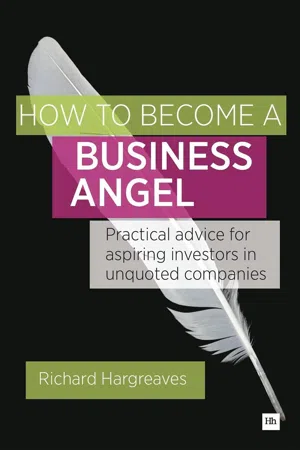
How To Become A Business Angel
Practical advice for aspiring investors in unquoted companies
- 310 pages
- English
- ePUB (mobile friendly)
- Available on iOS & Android
How To Become A Business Angel
Practical advice for aspiring investors in unquoted companies
About this book
Becoming a successful angelAngel investors are the most important source of capital for UK companies seeking up to £2 million in funding. This importance to the British economy is recognised by the government, which means that attractive tax breaks are available to business angels. Added to this, helping start-up ventures with money and mentoring can be satisfying and fun. If you have considered taking advantage of these tax incentives by making angel investments, or find the idea of providing capital to entrepreneurs - and the potential financial rewards of doing so - appealing, then your starting point should be How to Become a Business Angel.Richard Hargreaves has 40 years' experience making investments in unquoted companies and as such is well placed to guide those who are new to the area through the process. He knows what to look for in potential deals, the risk-reward structure angels should demand, the times when legal advice must be taken and the pitfalls to be wary of. In a concise, readable manner, he provides practical guidance to all aspects of investing in unquoted companies and gives numerous invaluable case studies from real-life deals so you can see how angel investments work in practice. You will learn:- Whether angel investing is right for you- How to find and assess opportunities - What investment terms angels require- How to manage investments you have made and resolve problems that arise- How to exit from investments- Lessons from real-life deals that went well, and badly, through detailed case studiesIf you are looking to build a portfolio of investments in unquoted companies, wish to learn more about the technical side of investment, such as share capital structures and investors' legal rights, or wish to invest your capital in entrepreneurial ventures in the most effective for both you and the entrepreneurs, then this book is for you.
Frequently asked questions
- Essential is ideal for learners and professionals who enjoy exploring a wide range of subjects. Access the Essential Library with 800,000+ trusted titles and best-sellers across business, personal growth, and the humanities. Includes unlimited reading time and Standard Read Aloud voice.
- Complete: Perfect for advanced learners and researchers needing full, unrestricted access. Unlock 1.4M+ books across hundreds of subjects, including academic and specialized titles. The Complete Plan also includes advanced features like Premium Read Aloud and Research Assistant.
Please note we cannot support devices running on iOS 13 and Android 7 or earlier. Learn more about using the app.
Information
Part B: Investment Opportunities
Chapter 3: Finding Investment Opportunities
Introduction
Matching entrepreneurs and angels
The importance of deal flow
How to find opportunities
Contacts
The unsolicited deal
The internet
Cautionary note
Crowd funding
Angels dating companies
Table of contents
- Cover
- Publishing details
- About the Author
- Preface
- Introduction
- Part A: Angel Investing
- Part B: Investment Opportunities
- Part C: Managing Investments
- Part D: The Exit
- A Final Thought
- Glossary